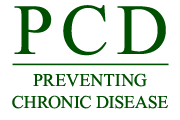PCD News Summary for September 7, 2017

Notice to News Media – PCD Release Time and Embargo Policy:
CDC’s News Media Branch releases to reporters the PCD media packet every Tuesday afternoon between 12 and 2 pm.
Embargoed until Thursday, September 7, at 12:00 PM ET
Differences Between Younger and Older US Adults with Multiple Chronic Conditions
Most Americans with multiple chronic conditions are of working age, and researchers say poor access to healthcare may be preventing them from getting the treatment they need to maintain optimal quality of life. Data from respondents to the 2015 Behavioral Risk Factor Surveillance System were used to compare adults aged 65 or older with multiple chronic conditions (MCCs) with those younger than 65 with MCCs. Variables analyzed included chronic conditions, quality of life measures, disability status, access to health care, and modifiable risk factors. Researchers found that more than 60 percent of adults with MCCs were younger than 65 years old and were more likely to report asthma, cognitive impairment, depression, smoking, obesity, poorer access to health care, disability, and worse quality of life. Researchers concluded that adequate treatment could help decrease the burden of chronic diseases among adults younger than 65 and reduce the chance of developing more chronic conditions as they age.
Melissa Newton
mnewton@cdc.gov
404-718-6281
Implementation of Best Practices in Obesity Prevention in Child Care Facilities: The Arizona Empower Program, 2013–2015
Despite some limitations, an Arizona childhood obesity prevention program can provide insights into an ongoing statewide effort to implement an obesity prevention program with the potential to improve the health of and reduce obesity in preschool-age children. The Arizona Department of Health Services (ADHS) developed the Empower Program to promote healthy environments in licensed child care facilities. Standards include best practices, which ultimately may lead to a reduction in childhood obesity, including standards related to physical activity and screen time, breastfeeding, fruit juice and water consumption, and family-style meals. Participating child care facilities in Arizona receive discounted licensing fees for their agreement to follow the standards. During their annual licensing inspections, ADHS licensing staff collect self-assessments on implementation, and offer education and technical assistance. This research describes results from assessments completed by 1,850 facilities during a two-year period to evaluate implementation of Empower standards related to childhood obesity and identify barriers and areas in which facilities will need more education, technical assistance, and support.
Melissa Newton
mnewton@cdc.gov
404-718-6281
Aspirin for Prevention of Cardiovascular Disease
Data from Mississippi suggest that a significant proportion of eligible adults could benefit from using aspirin to prevent cardiovascular disease (CVD). Researchers used data from the 2013 Mississippi Behavioral Risk Factor Surveillance System to examine aspirin use for the prevention of primary and secondary cardiovascular disease, based on the 2009 U.S. Preventive Services Task Force guidelines, among Mississippi men (aged 45–79 y) and women (aged 55–79 y) and to explore differences in aspirin use by sociodemographic characteristics. Among those without CVD, 39.1 percent of men and 45.9 percent of women reported taking aspirin. Among those with CVD, 85.9 percent of men and 85.1 percent of women reported taking aspirin
Melissa Newton
mnewton@cdc.gov
404-718-6281
###
Note: Not all articles published in PCD represent work done at CDC. In your stories, please clarify whether a study was conducted by CDC (“a CDC study”) or by another institution (“a study published by CDC”). The opinions expressed by authors contributing to PCD do not necessarily reflect the opinions of CDC or the institutions with which the authors are affiliated. PCD requests that, when possible, you include a live link to the article in your stories.
###
U.S. DEPARTMENT OF HEALTH AND HUMAN SERVICES
CDC works 24/7 protecting America’s health, safety and security. Whether diseases start at home or abroad, are curable or preventable, chronic or acute, stem from human error or deliberate attack, CDC is committed to respond to America’s most pressing health challenges.
